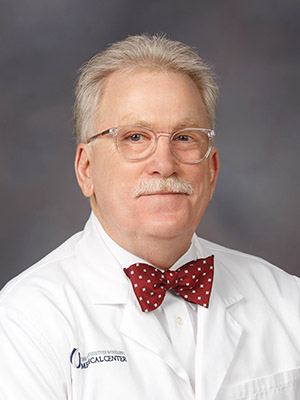Q2 grants and awards bring $27 million to UMMC
Published on Tuesday, January 18, 2022
By: Karen Bascom
The University of Mississippi Medical Center garnered 104 new, continuing, transferred and revised grants and awards from October through December 2021, totaling $26,904,653. The following personnel received the largest new and competitive renewal awards during the quarter. Dollar values shown represent the first year of funding or the anticipated total funding for a multi-year award.
 Chandra
ChandraDr. Saurabh Chandra, director of the Center for Telehealth, received $3.25 million from the Health Resources and Services Administration for the project, “Telehealth Center for Excellence.”
 Pantazopoulos
PantazopoulosDr. Harry Pantazopoulos, assistant professor of neurobiology and anatomical sciences, received a four-year, $1.58 million grant from the NIH for the project, “Diurnal molecular rhythms of the human hypothalamus and involvement in bipolar disorder” and $199,999 from the Baszucki Brain Research Fund / Milken Institute for the project, “CACNA1C genotype: Correlation with brain and blood levels of CACNA1C and treatment responsiveness.”
 Ojeda
OjedaDr. Norma Ojeda, professor of pediatrics, received $1 million from the Department of Health and Human Services for the project, “Mississippi perinatal COVID-19 registry.”
 Mosley
MosleyDr. Thomas Mosley, director of The MIND Center, received $883,410 from the National Institutes of Health for the “ARIC Study field center.”
 Santos
SantosDr. Roberto Santos, professor of pediatrics, received $559,370 and $236,838 for two industry-sponsored research agreements.
 Jones
JonesDr. Alan Jones, associate vice chancellor for clinical affairs, received $415,400 from the National Institutes of Health and Vanderbilt University Medical Center for the project, “ACTIV 4d RAAS” and $56,350 from NIH and Beth Israel Deaconess Medical Center for the “PETAL network international coordinating center for ACTIV-3 trial initiative.”
 Warrington
WarringtonDr. Paula Warrington, assistant professor of neurology, received $389,514 from the NIH for the project, “Mechanisms of seizure in pregnancy and preeclampsia.”
 Marshall
MarshallDr. Gailen Marshall, R. Faser Triplett Sr. Chair in Allergy and Immunology, received $566,789 from the NIH and the West Virginia Clinical and Translational Science Institute for the project, “PASC Initiative - clinical recovery cohort” and $130,955 from the NIH and Rhode Island Hospital for the project, “Impact of sleep duration on immune balance in urban children with asthma.”
 Shafi
ShafiDr. Tariq Shafi, John D. Bower Chair of Nephrology and Hypertension, received $394,112 and $233,175 for two industry-sponsored research agreements.
 Compretta
ComprettaDr. Caroline Compretta, associate professor of preventive medicine, received $533,575 from the NIH for the project, “CEAL - community engagement research alliance against COVID-19 in disproportionately affected communities.”
 Davis
DavisDr. Tearsanee Davis, director of clinical operations for the Center for Telehealth, received $343,358 from the Health Services and Resources Administration for the project, “Evidence-based tele-behavioral health network program.”
 Sims
SimsDr. Mario Sims, chief science officer of the Jackson Heart Study, received $259,158 from the NIH and Columbia University for the project, “Evaluating standing as a health behavior to promote cardiovascular risk reduction in African Americans.”
 Stewart
StewartDr. Mary Stewart, professor of nursing, received $180,000 from the NIH for the project, “Procurement of services to obtain follow-up procedures and outcome information on women with abnormal screening results from the STRIDES study” and $67,860 from the NIH for personnel funds.
 Tang
TangDr. Shou-Ching Tang, professor of medicine, received 235,536 for an industry-sponsored research agreement.
 Granger
GrangerDr. Joey Granger, dean of the School of Graduate Studies in the Health Sciences, received 202,004 from the NIH and University of Chicago for the project, “Luteolin as a therapeutic for hypertension in pregnancy.”
 Buttross
ButtrossDr. Susan Buttross, professor of pediatrics, received $3.5 million from the Health Resources and Services Administration for the project, “Early childhood health promotion system for high-need program.”
 Henegan
HeneganDr. John Clark Henegan, associate professor of medicine, received $187,915 for an industry-sponsored research agreement.
 Kutcher
KutcherDr. Matthew Kutcher, assistant professor of surgery, received $159,000 from the NIH and Duke University for the project, “ACTIV4C - A multicenter, adaptive, prospective, randomized trial evaluating the efficacy and safety of antithrombotic strategies in patients with COVID-19 following hospital discharge.”
 Janorkar
JanorkarDr. Amol Janorkar, chair of the Department of Biomedical Materials Science, received $100,000 from the Department of Defense for the project, “Use of atomic force microscopy to study cell-cell adhesion.”
 Nandi
NandiDr. Utsav Nandi, assistant professor of emergency medicine, received $95,123 for an industry-sponsored research agreement.
 McNaull
McNaullDr. Melissa McNaull, professor of pediatrics, received $75,141 from the HRSA and the University of Alabama for the project, “Education and mentoring to bring access to comprehensive care (EMBRACE) network.”
 Grayson
GraysonDr. Bernadette Grayson, associate professor of neurobiology and anatomical sciences, received $75,000 from the Cervical Spine Research Society for the project, Glycemic dysfunction in a cervical model of spinal cord injury.”
 Novotny
NovotnyDr. Sarah Novotny, associate professor of obstetrics and gynecology, received $73,333 for an industry-sponsored research agreement.
 Huang
HuangDr. Juebin Huang, associate professor of neurology, received $71,442 for an industry-sponsored research agreement.
 Chandra
ChandraDr. April Carson, director of the Jackson Heart Study, received $70,965 from HHS for the project, “Prioritizing county-level social determinants that contribute to the greater burden of diabetes and hypertension in the US.”
 Garla
GarlaDr. Vishnu Garla, associate professor of medicine, received $65,054 for an industry-sponsored research agreement.
 Torres
TorresDr. Elisa Torres, professor of nursing, received $60,000 from the Alzheimer’s Association for the project, “Physical activity across the life course and risk of ADRD.”
 Morellato
MorellatoDr. John Morellato, assistant professor of orthopedic surgery, received $59,472 for an industry-sponsored research agreement.
 Fox
FoxDr. Ervin Fox, professor of medicine, received $55,800 from the NIH and Washington University for the project, “A multi-ancestry study of gene-lifestyle interactions and multi-omics in cardiometabolic traits.”
 Tullis
TullisDr. Jason Tullis, associate professor of neurosurgery, received $50,050 for an industry-sponsored research agreement.
 McKenzie
McKenzieDr. Kendall McKenzie, chair of the Department of Emergency Medicine, received $50,000 from the NIH and MSDH for the “SMRS Med Control.”